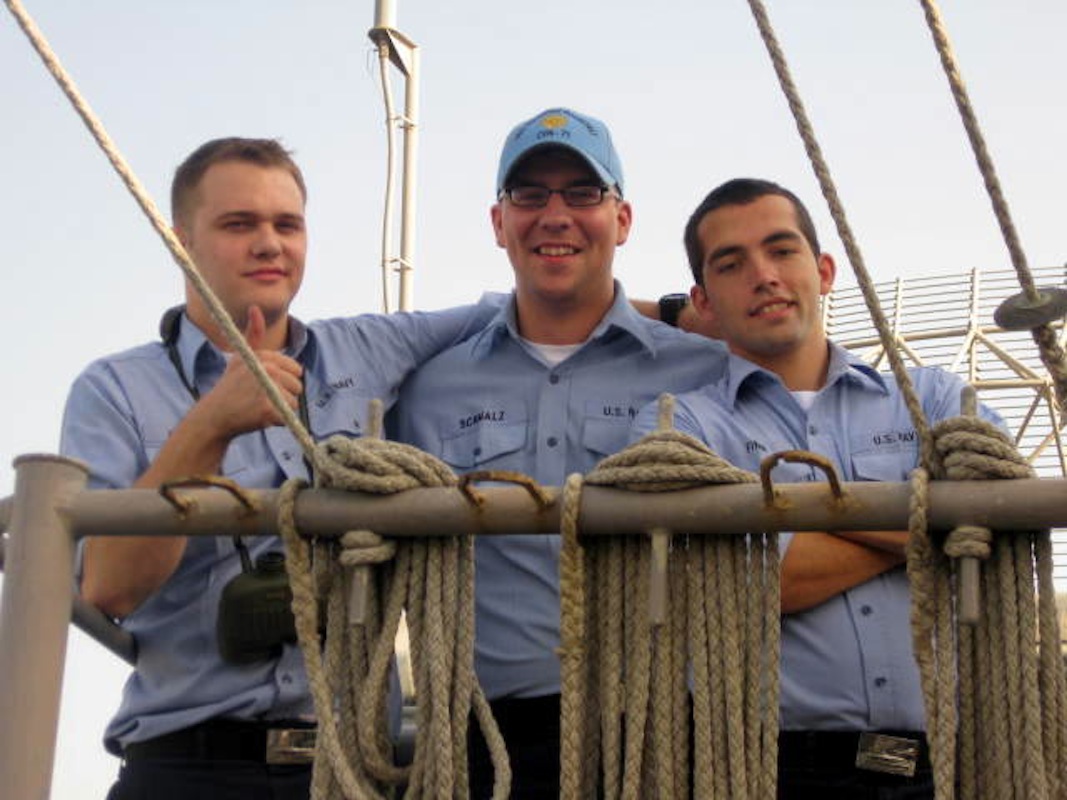Through engaging with fellow servicemen and bringing awareness to the campus community, student veterans at Gustavus learn to succeed in a different kind of environment, an environment where managing chaos means balancing schoolwork and family life, as opposed to leading fellow soldiers, sailors, airmen, or marines.
Not every student follows the traditional path from high school to college to career. Some students never go on to further education. Some students take a gap year before entering college. And some students join the military.
Students decide to serve in the military for many different reasons: to pay for school, to learn discipline, to connect with family members who are veterans, and many other reasons. After serving, veterans find the transition into the school environment to be challenging and stressful at times, especially when they must interact and relate with students who are often much younger than themselves. But through engaging with other student veterans and bringing awareness of veterans to the campus community, student veterans at Gustavus learn to succeed in a different kind of environment, an environment where managing chaos means balancing schoolwork and family life, as opposed to leading fellow soldiers, sailors, airmen, or marines.

Senior Communication Studies Major Danny Schmalz joined the Navy right after high school in 2005, partly to connect with his grandfather who was in the Navy, and partly to find the means to an end for a career.
Schmalz deployed twice, first to the Persian Gulf, and then to the northern Arabian Sea, before leaving the Navy in 2009.
“During those deployments, you clock in a lot of time, and you see a lot of jets take off with bombs, and a lot of jets come back with none. You see different parts of people, both good and bad, and managing chaos becomes normal, and almost what you want,” Schmalz said.
For Schmalz, those four years were both the best and worst four years of his life. Yet, according to him, they were easier than college.
“It’s easy to do something when you have authority, and it’s easy to do something when someone just tells you what your role is. In college, I feel like you’re kind of on your own in a lot of ways, to manage your own chaos, and how you do that determines your success or failure in whatever capacity you’re trying to be successful in,” Schmalz said.
One of the hardest parts of transitioning to Gustavus from the Navy for Schmalz was seeing people worry and stress over relatively unimportant issues.
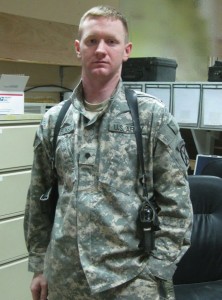
“Part of the struggle for me is that it’s tough to transition in the sense that you have a different standard for how you operate, and you have a different standard of how you expect everybody else around you to view this world. You look at a lot of the stuff that people are fretting about, and you find that it’s very trivial and meaningless, and all you want to do is tell them, ‘you’re worried about the wrong things.’ After seeing and being around people that have gone through some pretty traumatic things, all this other stuff becomes meaningless. And so there’s a struggle of finding meaning in a system that’s designed to perpetuate that idea of success that we don’t necessarily always agree with,” Schmalz said.
Senior Political Science and History Major R. Eiler Henrickson also joined the military out of high school. He joined the Army in July 2004 and deployed twice before leaving the Army in December of 2009. His first deployment, from 2006 to 2007, was to Afghanistan, and his second was to Iraq from 2008 to 2009.
“It’s been a weird transition. Coming out of the military, you have a lot more free time, so a lot more time to think and do stuff you like, but at the same time, your responsibility level goes up,” Henrickson said.
Instead of having one distinct duty when they came to Gustavus, these veterans had to find a balance between schoolwork, extracurricular activities, and family; both Henrickson and Schmalz are married.
“Being a college student coming out of a work situation where you’re a leader, and then coming to a school situation where you’re back at the bottom of the totem pole in many ways, is tough. And so you try to find meaning in this, and you’re doing this because this is your reward for your service, and so you work on how to come to terms with that in a way that’s productive. Because we’re coming from high-stress situations of managing chaos and going to focusing on getting good grades, being a good husband, and all those types of things that become important, so it gets hard to strike that balance in a productive way,” Schmalz said.
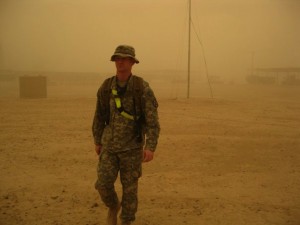
But when it comes down to it, family comes first for the two veterans.
“That’s our priority. That’s number one before everything else. So for me, socially and otherwise, I put my family first. There have been a few issues with that, but for the most part it’s been all right. And Danny and I are both on our way out because we’ll be graduating this year, so that helps,” Henrickson said.
Even though there is more to balance and a higher level of responsibility at college, it still gets pretty quiet around campus for Schmalz and Henrickson. They sometimes find themselves creating high-stress situations for themselves in order for things to feel normal again, as if they were back in the military.
“Every now and then I’ll push off an assignment until the night before, just so I’ve got pressure because that’s when I excel,” Henrickson said.
Henrickson is in Student Senate, but he is still trying to find a leadership position that’s comparable to leading soldiers.
“It’s been difficult for me to deal with people who are so much younger than I am. When I’m in Student Senate, I’m with 20 or 21 year-olds, whereas I’ll be turning 28 soon. I think that’s been kind of a challenge for me, to be able to kind of get down to that level,” Henrickson said.
Senior Political Science Major Zac Zillmer joined the military under slightly different conditions than Henrickson and Schmalz. After spending a couple of years at Gustavus right out of high school, Zillmer recognized that school wasn’t going so well and realized he needed “a good way to get my life on the right path, learn discipline, and learn good work skills so that I wouldn’t get stuck in a dead-end job.”
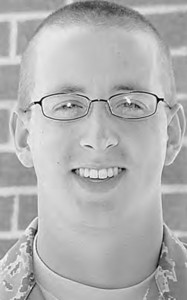
Zillmer left Gustavus and enlisted in the Air Force in 2007. He was in active duty from March 2008 to May 2011. Following his three years in active duty, Zillmer re-enrolled at Gustavus and will graduate this December. He has been in the Air Force Reserves of Minneapolis since leaving active duty and will be done next March.
Playing football helped make Zillmer’s transition back to school much easier. He played when he first came to Gustavus, so knowing the coaches and being in contact with them made things easier when he came back.
“I was able to meet a lot of the guys before the rest of the students came on campus, so that was nice because it wasn’t like I didn’t know anybody. Working with a team and working with others really helped my transition,” Zillmer said.
Before joining the military, managing time was a big issue for Zillmer.
“I wasn’t mature enough to be able to manage my time well, but in the military you’re pretty much told where you have to be every hour of the day. So I kind of like not having that now, because I know what I have to do. I’m better equipped to manage my time on my own now. And, particularly if it’s a limited amount of time, like free time, you learn to make the most of it,” Zillmer said.
Out of coincidence, Zillmer ended up sitting next to another student veteran in his first class back at Gustavus, which is ironic considering the small number of veterans on campus.
But even with such a small number of veterans around, Schmalz and Henrickson were able to form the Student Veterans Organization. It took a little while, but eventually they got enough people to be recognized by the Campus Activities Office, and the organization currently has six members.
For the veterans, having fellow veterans around to talk to and relate to helps manage stress.
“Life kind of kicks you in the face sometimes, and there’s stuff you carry with you from the service, and there’s that struggle of being an adult in a student world and how to manage that, and so being in the Student Veterans Organization is a good thing because of the conversations you can have when you’re together. What we’re able to accomplish as a group is more relational and more meaningful for mental health in general terms, because we share those experiences with people who have an understanding,” Schmalz said.
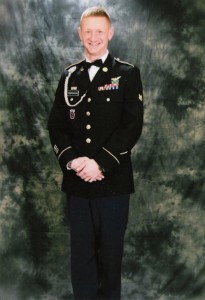
In addition to the relational aspect of the group, the Student Veterans Organization also holds a ceremony on Veterans Day, Nov. 11, and puts on a fundraising drive for veterans in the spring.
“The organization was designed also to bring a little bit of awareness to the campus about veterans and how there’s a lot of us coming home and to be ready to see us,” Henrickson said.
Along with this comes awareness of people still serving in the military. If there’s one thing students should do, it’s to not be apathetic about the wars going on, according to Schmalz.
“It’s their brothers, sisters, and cousins, and everybody that’s giving time to fighting, and it’s a lot closer to home than people realize. It’s not just a TV show, it’s not just a 30 second spot on NBC; it’s real life, and it’s happening and it’s going to continue to happen. Just don’t be apathetic about it,” Schmalz said.
